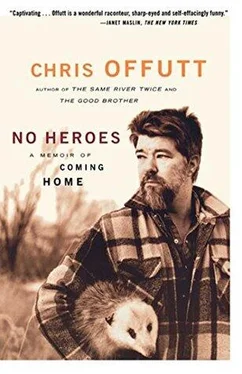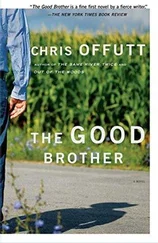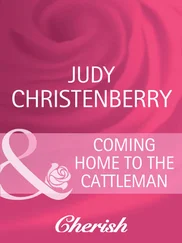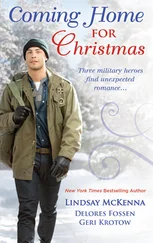“Yes siree, you have. That movie’s the best thing since eggs, but run and get you a new one.”
The boy hurried to the shelf. Nine-Mile turned to me and spoke.
“His memory’s about as long as his pecker.”
“I have the same problem.”
He laughed and I gestured to the videotape under his arm.
“What movie you getting?” I said.
“I’m bringing back Deliverance. You seen it?”
“Yeah. The music in it’s good.”
“I didn’t like it one bit.”
I stepped closer, eager to hear his opinions. I despise the movie’s stereotypical depiction of rural people. Nine-Mile’s disdain was a pleasant surprise.
“How come you not to like it?” I said.
“At the end when that old boy gets shot with a crossbow, the arrow sticks out of his chest. As close as he was, it’d go right through him.”
“I never thought about it,” I said.
“Oh, yeah. I’m a bow-hunter. When I see something in a movie that’s supposed to be real but ain’t, I’m done with it.”
“What about the way those country people were?”
“A pretty rough bunch, if you ask me. I’d not fool with them. They’re from so far back in the hills they went toward town to hunt.”
I laughed as he scanned the aisles for his kids.
“You still writing books?” he said.
“Yes.”
“Good trade. It’s nice to see a Haldeman boy make something of hisself.”
“I just worked hard and got lucky is all.”
“Do you print them up yourself?”
“No, there’s a company in New York that takes care of that for me.”
“I see,” he said. “You subcontract it out.”
“Something like that.”
“How long’s it take to write a book, Chris? About a month?”
“Longer for me. What makes you think a month?”
“That’s when they change the paperbacks at Wal-Mart.”
The conversation stopped, but I knew he wanted to talk. We both stood awkwardly. I studied his large hands, once so adept with a football and basketball, now gnarled and battered like old tools. He was missing two fingers.
“What are you doing these days?” I said.
“I’m a logger and a tobacco farmer. Guess I’m what you’d call an endangered species. I’m getting out of farming. No money.”
“What’ll you go into next?”
“I don’t know. I ain’t thought that far ahead.”
A child began to cry and Nine-Mile smiled apologetically and hurried away. Like many generations before him, he was engaged in the only industry offered by the land where he was born. Stores give credit until the tobacco harvest and every fall the new clothes on schoolkids will tell you how the prices are running at the burley auction. Nine-Mile lived on land his family had always owned and made a living from.
He retrieved a five-year-old girl and held her against his chest. Nine-Mile’s face softened to the boy I remembered, and it occurred to me that I should have lived in an earlier time. I’d still have the same personality, the same ancient soul. Born in the eighteenth century, I’d lament having missed the wonders of the seventeenth. If I were living in the Renaissance, I’d probably feel nostalgic for the Middle Ages. Continuing this way would make me a Cro-Magnon in a cave envying his brethren who still lived in the trees.
I left the video store with several movies for the kids. The afternoon sun leaned into the hills across the parking lot, surrounded by chain stores that manacled the land. Across the vast sea of black tar stood Wal-Mart. People were excited when Wal-Mart first arrived until the low prices killed local stores. Now there is nowhere else to shop. It cares as little for its customers as the old company store in my hometown did. The only difference is that scrip is legal in the form of a charge card. If Wal-Mart doesn’t carry an item, you are compelled to do without. People accept this with typical mountain resignation, putting a melancholy forward spin on it with a new slogan: Everything’s at Wal-Mart. Technically that’s true, because if something isn’t there, it does not exist here.
Behind Wal-Mart like a ramparts to the hills is the first planned development in Rowan County. The neighborhood was such a success that the Church of God closed its doors in town and built a new one behind the mall. It is now known as the Wal-Mart Church of God.
One is tempted to say that Wal-Mart killed what was once a thriving town. One could just as well blame the interstate. The real culprit is the end of the rail industry. This was preceded by the decline of the riverboat era, the invention of the horseless buggy, the westward expansion, the discovery of the Cumberland Gap, the European invasion, the Puritan pioneers and subsequent waves of immigration, the voyages of Columbus, the Viking explorers, the landbridge walkers, the death of the dinosaurs, and the great breaking apart of the continents.
All of this ruined Morehead in twenty years.
I knew Irene when she was ten years old. We used to go for vacations together. She was just a girl. I was a boy. I found Irene after they shot her mother. She wasn’t even crying, she was just laying there. There were at least eight, nine people in the room. And that room was ten by twelve feet. The beds were separated by a curtain for some kind of privacy. The smell was magnificent. Electricity was on and off. I spent the first night with my wife in this Devils kitchen. What do you say to somebody who’s lost everything? She couldn’t save her mother; she was just devastated. What do you say to her? Let’s make the best of it? I said nothing. She just laid there in my arms. The next day I told her, you’re gonna be with me as long as we can.
In camp, if it was not going the way I like, I never despair. I disconnect my thoughts. I don’t think about the tragic things. I think of something else which is more pleasant or nice for me. When I disconnect I think that just surviving is the most important and then forget about it. I have terrible fear. I suffered the most from fear. I was scared of everything around me, but when I disconnect, it’s like not me. Somebody else.
We eat potato soup, the skins. That saved us because that’s the most healthy part, but they didn’t know it. Once a week a piece of bread. All the women stopped menstruating.
As a girl I wasn’t very happy. My sister was dead and my father was dying. So my mother did everything for me. She picked my clothes. She pick my friends. She pick what I do, where I go, what I eat. In camp she picks nothing. For the first time, I have freedom.
The odd thing about this book is I never set out to write it. The audiotapes were intended for the kids and the rest came from my journals. When I hit on the idea of bringing these disparate narratives together, I called Arthur for permission to use the tapes. There was a long silence on the phone, until he said, “To write this book, Sonny, is like telling the lions not to eat the antelope.”
Now I call him once a week to double-check facts and details. Spelling Polish proper nouns is confounding, and my attempts at syllabic representation produce gobbledy-gook. Our conversations trigger his memory and I take notes as we talk. Soon, I begin transcribing all that he says.
Arthurs life is hard now. His neighborhood in Queens has changed and no one will shovel snow from his walk. His car inexplicably became filled with ice, his basement with water. Irene has Parkinson’s disease and requires a great deal of care. He is a little depressed. I ask if he’s reading, and he says yes, a book on the Spanish Inquisition.
He is not angry at the German army because he was a soldier and understands the mentality of serving ones country. He feels most betrayed by his fellow Poles, especially members of the Jewish Police.
Читать дальше












